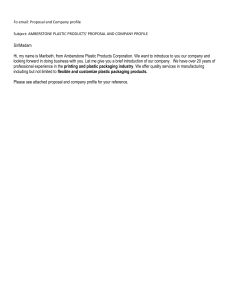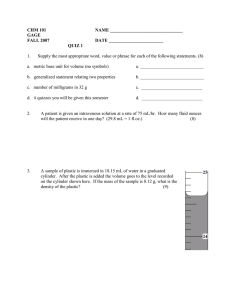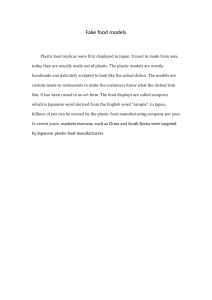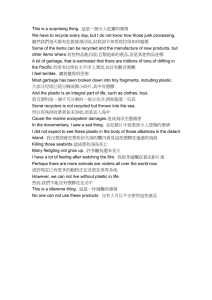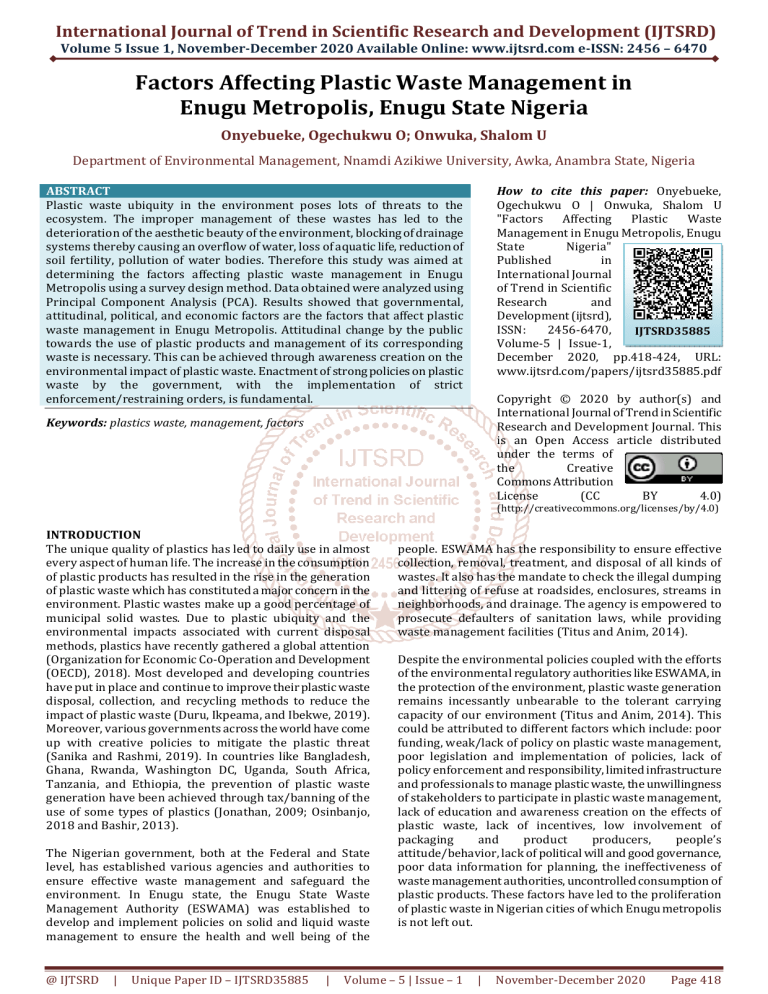
International Journal of Trend in Scientific Research and Development (IJTSRD)
Volume 5 Issue 1, November-December 2020 Available Online: www.ijtsrd.com e-ISSN: 2456 – 6470
Factors Affecting Plastic Waste Management in
Enugu Metropolis, Enugu State Nigeria
Onyebueke, Ogechukwu O; Onwuka, Shalom U
Department of Environmental Management, Nnamdi Azikiwe University, Awka, Anambra State, Nigeria
How to cite this paper: Onyebueke,
Ogechukwu O | Onwuka, Shalom U
"Factors
Affecting
Plastic
Waste
Management in Enugu Metropolis, Enugu
State
Nigeria"
Published
in
International Journal
of Trend in Scientific
Research
and
Development (ijtsrd),
ISSN:
2456-6470,
IJTSRD35885
Volume-5 | Issue-1,
December 2020, pp.418-424, URL:
www.ijtsrd.com/papers/ijtsrd35885.pdf
ABSTRACT
Plastic waste ubiquity in the environment poses lots of threats to the
ecosystem. The improper management of these wastes has led to the
deterioration of the aesthetic beauty of the environment, blocking of drainage
systems thereby causing an overflow of water, loss of aquatic life, reduction of
soil fertility, pollution of water bodies. Therefore this study was aimed at
determining the factors affecting plastic waste management in Enugu
Metropolis using a survey design method. Data obtained were analyzed using
Principal Component Analysis (PCA). Results showed that governmental,
attitudinal, political, and economic factors are the factors that affect plastic
waste management in Enugu Metropolis. Attitudinal change by the public
towards the use of plastic products and management of its corresponding
waste is necessary. This can be achieved through awareness creation on the
environmental impact of plastic waste. Enactment of strong policies on plastic
waste by the government, with the implementation of strict
enforcement/restraining orders, is fundamental.
Copyright © 2020 by author(s) and
International Journal of Trend in Scientific
Research and Development Journal. This
is an Open Access article distributed
under the terms of
the
Creative
Commons Attribution
License
(CC
BY
4.0)
Keywords: plastics waste, management, factors
(http://creativecommons.org/licenses/by/4.0)
INTRODUCTION
The unique quality of plastics has led to daily use in almost
every aspect of human life. The increase in the consumption
of plastic products has resulted in the rise in the generation
of plastic waste which has constituted a major concern in the
environment. Plastic wastes make up a good percentage of
municipal solid wastes. Due to plastic ubiquity and the
environmental impacts associated with current disposal
methods, plastics have recently gathered a global attention
(Organization for Economic Co-Operation and Development
(OECD), 2018). Most developed and developing countries
have put in place and continue to improve their plastic waste
disposal, collection, and recycling methods to reduce the
impact of plastic waste (Duru, Ikpeama, and Ibekwe, 2019).
Moreover, various governments across the world have come
up with creative policies to mitigate the plastic threat
(Sanika and Rashmi, 2019). In countries like Bangladesh,
Ghana, Rwanda, Washington DC, Uganda, South Africa,
Tanzania, and Ethiopia, the prevention of plastic waste
generation have been achieved through tax/banning of the
use of some types of plastics (Jonathan, 2009; Osinbanjo,
2018 and Bashir, 2013).
The Nigerian government, both at the Federal and State
level, has established various agencies and authorities to
ensure effective waste management and safeguard the
environment. In Enugu state, the Enugu State Waste
Management Authority (ESWAMA) was established to
develop and implement policies on solid and liquid waste
management to ensure the health and well being of the
@ IJTSRD
|
Unique Paper ID – IJTSRD35885
|
people. ESWAMA has the responsibility to ensure effective
collection, removal, treatment, and disposal of all kinds of
wastes. It also has the mandate to check the illegal dumping
and littering of refuse at roadsides, enclosures, streams in
neighborhoods, and drainage. The agency is empowered to
prosecute defaulters of sanitation laws, while providing
waste management facilities (Titus and Anim, 2014).
Despite the environmental policies coupled with the efforts
of the environmental regulatory authorities like ESWAMA, in
the protection of the environment, plastic waste generation
remains incessantly unbearable to the tolerant carrying
capacity of our environment (Titus and Anim, 2014). This
could be attributed to different factors which include: poor
funding, weak/lack of policy on plastic waste management,
poor legislation and implementation of policies, lack of
policy enforcement and responsibility, limited infrastructure
and professionals to manage plastic waste, the unwillingness
of stakeholders to participate in plastic waste management,
lack of education and awareness creation on the effects of
plastic waste, lack of incentives, low involvement of
packaging
and
product
producers,
people’s
attitude/behavior, lack of political will and good governance,
poor data information for planning, the ineffectiveness of
waste management authorities, uncontrolled consumption of
plastic products. These factors have led to the proliferation
of plastic waste in Nigerian cities of which Enugu metropolis
is not left out.
Volume – 5 | Issue – 1
|
November-December 2020
Page 418
International Journal of Trend in Scientific Research and Development (IJTSRD) @ www.ijtsrd.com eISSN: 2456-6470
LITERATURE REVIEW
In a study of plastic waste menace in Kenya, Ong’unya,
Aurah, Nabwire and Songok (2014) established that the
main factors that contribute to the accumulation of plastic
wastes included: lack of adherence to the guidelines on solid
waste management by stakeholders in the city, failure of the
City Council to address the problem of plastic bag waste due
to weak policies.
The result in the work of Aurah (2013), to assess the extent
to which plastic bag waste management methods used in
Nairobi City promote sustainability, revealed that the
problem of plastic bag waste is a consequence of ineffective
by-laws on littering and illegal dumping; inadequate garbage
collection and throw-away culture by the public. Inadequate
collecting and processing infrastructure lead to an increase
in plastic litter in the environment (Helen, Sabine, and
Margriet, 2016).
Onyenekenwa and Agbazue, (2011) conducted a review
study on the policy on the protection of Nigeria’s
environment. The result showed that many of the policies
were not formulated with contributions from informed
masses, nor based on nationally generated baseline data.
Rather, they are mostly guidelines and standards adopted
from the adopted and approved materials of the appropriate
system of the United Nations, thereby compromising socioeconomic and climatic differences. They also noted that
implementation and monitoring are wishy-washy and dindon affairs, crippled by widening and deepening corruption.
In the study on municipal solid waste management problems
in Nigeria: evolving knowledge management solution by
Beatrice and Jussi (2013), it was revealed that inefficient
management of waste by individuals, households,
consumers, and waste management companies can be
attributed to inadequate information on waste management
benefits, lack of producers’ involvement in waste
management as well as poor implementation of government
policies.
Ogwueleka (2009) carried out a study on municipal solid
waste characteristics and management in Nigeria. The result
showed that the common constraints faced by
environmental agencies in waste management include lack
of institutional arrangement, insufficient financial resources,
absence of by-laws and standards, inflexible work schedules,
insufficient information on quantity and composition of
waste, and inappropriate technology.
In exploring the understanding of residents’ and enterprises'
perceptions, behaviors, and their willingness to pay for
resources recycling by Song, Zhao, Lam, Zhu , Yuan, and
Wang (2019), the result showed that most of the
respondents do not separate their recyclable materials for
recycling. The study also noted that recycling facilities and
site conditions are very poor, including limited space for
recycling and storage, aging facilities, an informal recycling
process and a lack of workforce contributes to the problem.
On the attitudinal factors affecting plastic waste
management, it was observed that some people are aware of
the environmental implications of plastic waste but are not
willing to transform their awareness to practice (Gündoğdu,
Yesilyurt and Erbaş (2018); David and Richard (2015);
Srinivasan, Swarnapriya, Felix and Pravin (2019) ). However,
in a questionnaire-based study by Bright and Maurice (2016)
to identified households’ plastic waste management
practices and challenges, the result showed that dealing with
the problem of plastic waste required a change of attitude
towards waste disposal, discontinuation of plastic use,
recycling, and all stakeholder participation in waste
management.
METHODOLOGY
With the use of survey research design, data were collected
from 400 households in Enugu Metropolis comprising three
Local Government Areas which are: Enugu North L.G.A,
Enugu South L.G.A, and Enugu East L.G.A. Based on the
population density of households in each of the three Local
Government Areas, 126, 118, 156 questionnaires were
distributed to households in Enugu North L.G.A, Enugu South
L.G.A, and Enugu East L.G.A respectively. Principal
Component Analysis (PCA) was used to analyze the data to
identify the major factors affecting plastic waste
management. It involved the computation of the correlation
between the original data of each variable and the principal
component using the correlation procedure. To interpret the
principal components, the variables that are most strongly
correlated with each component were identified. The naming
of each component was dependent on variable loadings and
their strong correlation with the respective components.
RESULT AND FINDINGS
A. Principal Component Analysis Result for factors affecting plastic waste management in Enugu North LGA
The total variance explained as shown in Table 1 indicates how many components best explain the overall variation in the
original set of measured variables. Three components have been extracted which explains 89.535% of the overall variation in
the original set of variables. The first component explained 32.500% of the overall variance, the second component explained
32.156%, while the third component explained 24.879%. The three components were used to summarize the overall variation
in the original set of variables.
Table 1: Total Variance Explained in PCA for factors affecting plastic waste management in Enugu North LGA
Extraction Sums of Squared
Rotation Sums of Squared
Initial Eigenvalues
Loadings
Loadings
Component
% of
Cumulativ
% of
Cumulative
% of
Cumulative
Total
Total
Total
Variance
e%
Variance
%
Variance
%
1
23.653 78.842
78.842
23.653 78.842
78.842
9.750
32.500
32.500
2
2.165
7.218
86.060
2.165
7.218
86.060
9.647
32.156
64.656
3
1.043
3.475
89.535
1.043
3.475
89.535
7.464
24.879
89.535
The rotated component matrix as shown in Table 2 represents the correlation between each of the measured variables and
each extracted or retained component. The loading of each variable on each component after rotation reveals the following:
@ IJTSRD
|
Unique Paper ID – IJTSRD35885
|
Volume – 5 | Issue – 1
|
November-December 2020
Page 419
International Journal of Trend in Scientific Research and Development (IJTSRD) @ www.ijtsrd.com eISSN: 2456-6470
First Principal Component
The first principal component is strongly correlated with seventeen of the original variables. It increases with increasing values
for the seventeen variables which vary together. This principal component is a measure of the level of income, limited space for
recycling, insufficient financial resources, non-involvement of citizen in policymaking, negligence, non-cooperation with waste
management authorities, lack of interest in plastic recycling, lack/inefficient waste transportation equipment, inefficiency in
plastic waste collection, lack of interest in plastic reuse, use and throw away culture of the people, lack of interest in
government policies, reduced environmental monitoring, little or no encouragement on recycling, lack of adherence to
guidelines of waste management, lack of political will, non-implementation of extended producers responsibility. These
variables are classified as economic/attitudinal factors. It implies that the economic state of the area and the attitude of the
public effect plastic waste management.
Second Principal Component
The second principal component correlates with nineteen of the original variables. It increases with increasing values for these
variables. The second principal component correlates strongly with lack of interest in plastic recycling, lack/inefficient waste
transportation equipment, lack of interest in plastic reuse, reduced environmental monitoring, the ineffectiveness of waste
management authorities, lack of strict enforcement of environmental laws, lack of plastic waste management facilities,
lack/inadequate environmental policies and legislation, inappropriate technologies to manage plastic waste, limited
professionals to handle plastic waste, little or no encouragement on recycling, lack of adherence to guidelines of waste
management, inefficient by laws on littering, lack of political will, non-implementation of extended producers responsibility,
poor implementation of government policies, low level of knowledge on environmental matters, low public awareness, lack of
concern for the environment. This component is an indication of Political factors.
Third Principal Component
The third principal component correlates positively with fifteen of the original variables and increases with increasing values
for these variables. It correlates strongly with negligence, non-cooperation with waste management authorities, inefficiency in
plastic waste collection, use and throw away culture of the people, lack of interest in government policies, reduced
environmental monitoring, inefficient by-laws on littering, lack of political will, non-implementation of extended producers
responsibility, non-segregation of waste at source, poor implementation of government policies, low level of knowledge on
environmental matters, corruption, low public awareness, lack of concern for the environment. These variables are classified as
attitudinal/governmental factors.
Table 2 Rotated Component Matrix in PCA for factors affecting plastic waste management in Enugu North LGA
Component
1
2
3
Level of income
.875
Limited space for recycling
.847
Insufficient financial resources
.812
Non-involvement of citizen in policymaking
.764
Negligence
.762
.591
Non-cooperation with waste management authorities
.754
.501
Lack of interest in plastic recycling
.735 .517
Lack/inefficient waste transportation equipments
.693 .574
Inefficiency in plastic waste collection
.669
.606
Lack of interest in plastic reuse
.650 .537
Use and throw away culture of the people
.641
.634
Lack of interest in government policies
.623
.545
Reduced environmental monitoring
.589 .505 .524
Ineffectiveness of waste management authorities
.945
Lack of strict enforcement on environmental laws
.902
Lack of plastic waste management facilities
.796
Lack/inadequate environmental policies and legislation
.767
Inappropriate technologies to manage plastic waste
.743
Limited professionals to handle plastic waste
.679
Little or no encouragement on recycling
.607 .661
Lack of adherence to guidelines of waste management
.516 .642
Inefficient by laws on littering
.632 .570
Lack of political will
.521 .619 .521
Non-implementation of extended producers responsibility .502 .573 .568
Non-segregation of waste at source
.785
Poor implementation of government policies
.554 .692
Low level of knowledge on environmental matters
.569 .681
Corruption
.669
Low public awareness
.558 .667
Lack of concern for the environment
.620 .634
@ IJTSRD
|
Unique Paper ID – IJTSRD35885
|
Volume – 5 | Issue – 1
|
November-December 2020
Page 420
International Journal of Trend in Scientific Research and Development (IJTSRD) @ www.ijtsrd.com eISSN: 2456-6470
B. Principal Component Analysis for factors affecting plastic waste management in Enugu South LGA
The total variance explained as shown in Table 3 indicates how many components best explain the overall variation in the
original set of measured variables. Two components have been extracted which explains 88.886% of the overall variation in the
original set of variables. The first component explained 45.089 percent of the overall variance, while the second component
explained 43.797 percent. These two components were used to summarize the overall variation in the original set of variables.
Table 3 Total Variance Explained in PCA for factors affecting plastic waste management in Enugu South LGA
Extraction Sums of Squared
Rotation Sums of Squared
Initial Eigenvalues
Loadings
Loadings
Component
% of
Cumulative
% of
Cumulative
% of
Cumulative
Total
Total
Total
Variance
%
Variance
%
Variance
%
1
24.971
83.237
83.237
24.971
83.237
83.237
13.527 45.089
45.089
2
1.695
5.649
88.886
1.695
5.649
88.886
13.139 43.797
88.886
The rotated component matrix (Table 4), representing the correlation between each of the measured variables and each
extracted or retained component, shows the loading of variables on each component.
First Principal Component
The first principal component is strongly correlated with twenty-three of the original variables. It increases with increasing
values for these variables. This component is a measure of the level of income, inefficient by-laws on littering, lack of interest in
plastic recycling, low public awareness, non-involvement of citizen in policymaking, lack of adherence to guidelines of waste
management, lack of plastic waste management facilities, ineffectiveness of waste management authorities, lack of interest in
plastic reuse, corruption, non-cooperation with waste management authorities, lack of interest in government policies, nonimplementation of extended producers responsibility, insufficient financial resources, limited professionals to handle plastic
waste, reduced environmental monitoring, non-segregation of waste at source, poor implementation of government policies,
lack/inefficient waste transportation equipment, negligence, inappropriate technologies to manage plastic waste, low level of
knowledge on environmental matters, lack of political will. These variables are classified as governmental/attitudinal factors.
Second Principal Component
The second principal component correlates strongly with twenty-five of the original variables. This component correlates
strongly with Lack of adherence to guidelines of waste management, lack of plastic waste management facilities, ineffectiveness
of waste management authorities, lack of interest in plastic reuse, corruption, non cooperation with waste management
authorities, lack of interest in government policies, non implementation of extended producers responsibility, insufficient
financial resources, limited professionals to handle plastic waste, reduced environmental monitoring, non segregation of waste
at source, little or no encouragement on recycling, lack of strict enforcement on environmental laws, limited space for recycling,
inefficiency in plastic waste collection, lack/inadequate environmental policies and legislation, lack of concern for the
environment, use and throw away culture of the people, poor implementation of government policies, lack/inefficient waste
transportation equipments, negligence, inappropriate technologies to manage plastic waste, low level of knowledge on
environmental matter, lack of political will. With respect to the variable loadings, this component is an indication of political
factors.
Table 4: Rotated Component Matrix in PCA for factors affecting plastic waste management in Enugu South LGA
Component
1
2
Level of income
.938
Inefficient by laws on littering
.883
Lack of interest in plastic recycling
.830
Low public awareness
.826
Non-involvement of citizen in policymaking
.824
Lack of adherence to guidelines of waste management
.784 .519
Lack of plastic waste management facilities
.781 .535
Ineffectiveness of waste management authorities
.774 .561
Lack of interest in plastic reuse
.773 .586
Corruption
.766 .549
Non-cooperation with waste management authorities
.755 .581
Lack of interest in government policies
.750 .575
Non-implementation of extended producers responsibility .747 .600
Insufficient financial resources
.713 .609
Limited professionals to handle plastic waste
.712 .614
Reduced environmental monitoring
.705 .579
Non segregation of waste at source
.692 .567
Little or no encouragement on recycling
.886
Lack of strict enforcement on environmental laws
.877
Limited space for recycling
.865
@ IJTSRD
|
Unique Paper ID – IJTSRD35885
|
Volume – 5 | Issue – 1
|
November-December 2020
Page 421
International Journal of Trend in Scientific Research and Development (IJTSRD) @ www.ijtsrd.com eISSN: 2456-6470
Inefficiency in plastic waste collection
Lack of/inadequate environmental policies and legislation
Lack of concern for the environment
Use and throw away culture of the people
Poor implementation of government policies
Lack/inefficient waste transportation equipments
Negligence
Inappropriate technologies to manage plastic waste
Low level of knowledge on environmental matters
Lack of political will
.544
.539
.533
.597
.585
.667
.853
.849
.846
.820
.794
.782
.778
.723
.715
.677
C. Principal Component Analysis for factors affecting plastic waste management in Enugu East LGA
From Table 5, two components have been extracted which explains 89.242% of the overall variation in the original set of
variables. The first component explained 46.539 percent of the overall variance, while the second component explained 42.703
percent. These two components were used to summarize the overall variation in the original set of variables.
Table 5 Total Variance Explained in PCA for factors affecting plastic waste management in Enugu East LGA
Extraction Sums of Squared
Rotation Sums of Squared
Initial Eigenvalues
Loadings
Loadings
Component
% of
Cumulative
% of
Cumulative
% of
Cumulative
Total
Total
Total
Variance
%
Variance
%
Variance
%
1
25.745 85.816
85.816
25.745
85.816
85.816
13.962 46.539
46.539
2
1.028
3.426
89.242
1.028
3.426
89.242
12.811 42.703
89.242
The rotated correlation between each of the measured variables and each extracted or retained component is shown in the
rotated component matrix in Table 6. It shows the loading of each variable on each component after rotation.
First Principal Component
The first principal component is strongly correlated with twenty-seven of the original variables. It increases with increasing
values for these variables. This component correlates strongly with limited professionals to handle plastic waste, lack of plastic
waste management facilities, lack of interest in government policies, non segregation of waste at source, insufficient financial
resources, lack of strict enforcement on environmental laws, non cooperation with waste management authorities,
inappropriate technologies to manage plastic waste, poor implementation of government policies, inefficient by laws on
littering, use and throw away culture of the people, low public awareness, corruption, lack/inefficient waste transportation
equipments, negligence, level of income, reduced environmental monitoring, lack of interest in plastic reuse, non
implementation of extended producers responsibility, low level of knowledge on environmental matters, lack/inadequate
environmental policies and legislation, inefficiency in plastic waste collection, little or no encouragement on recycling,
ineffectiveness of waste management authorities, lack of political will, limited space for recycling, non involvement of citizen in
policymaking. These variables are classified as governmental/economic factors.
Second Principal Component
The second principal component correlates strongly with twenty-four of the original variables and increases with increasing
values for these variables. The second principal component correlates strongly with lack of strict enforcement of environmental
laws, non-cooperation with waste management authorities, inappropriate technologies to manage plastic waste, poor
implementation of government policies, use and throw away culture of the people, low public awareness, corruption,
lack/inefficient waste transportation equipment, negligence, level of income, lack of adherence to guidelines of waste
management, lack of concern for the environment, lack of interest in plastic recycling, reduced environmental monitoring, lack
of interest in plastic reuse, non-implementation of extended producers responsibility, low level of knowledge on environmental
matters, lack/inadequate environmental policies and legislation, inefficiency in plastic waste collection, little or no
encouragement on recycling, the ineffectiveness of waste management authorities, lack of political will, limited space for
recycling, non-involvement of citizen in policymaking. These variables are classified as political/attitudinal factors.
Table 6: Rotated Component Matrix in PCA for factors affecting plastic waste management in Enugu East LGA
Component
1
2
Limited professionals to handle plastic waste
.851
Lack of plastic waste management facilities
.827
Lack of interest in government policies
.817
Non-segregation of waste at source
.808
Insufficient financial resources
.805
.
Lack of strict enforcement on environmental laws
.795 .552
Non-cooperation with waste management authorities
.782 .551
Inappropriate technologies to manage plastic waste
.774 .559
Poor implementation of government policies
.761 .590
@ IJTSRD
|
Unique Paper ID – IJTSRD35885
|
Volume – 5 | Issue – 1
|
November-December 2020
Page 422
International Journal of Trend in Scientific Research and Development (IJTSRD) @ www.ijtsrd.com eISSN: 2456-6470
Inefficient by laws on littering
Use and throw away culture of the people
Low public awareness
Corruption
Lack/inefficient waste transportation equipments
Negligence
Level of income
Lack of adherence to guidelines of waste management
Lack of concern for the environment
Lack of interest in plastic recycling
Reduced environmental monitoring
Lack of interest in plastic reuse
Non-implementation of extended producers responsibility
Low level of knowledge on environmental matters
Lack/inadequate environmental policies and legislation
Inefficiency in plastic waste collection
Little or no encouragement on recycling
Ineffectiveness of waste management authorities
Lack of political will
Limited space for recycling
Non involvement of citizen in policy making
DISCUSSION
The study revealed that in Enugu North and Enugu East
L.G.A, governmental, attitudinal, political, and economic
factors are all contributory factors to plastic waste
management in the area. While in Enugu South L.G.A,
governmental, attitudinal, and political factors are all
contributory factors to plastic waste generation in the areas.
Lack of adherence to guidelines of waste management by the
citizens, low level of knowledge on environmental matters,
people’s lack of concern for the environment, use and throw
away culture of the people, lack of interest in government
policies, non-cooperation with waste management
authorities, non-segregation of waste at source are all part of
attitudinal factors that have affected the management of
plastic waste in Enugu Metropolis. This is coupled with the
governmental/political factors which include lack of plastic
waste management facilities, inefficient by-laws on littering,
low public awareness, lack of strict enforcement of
environmental laws, lack of political will, inappropriate
technologies to manage plastic waste, corruption, reduced
environmental monitoring, lack/inadequate environmental
policies and legislation among others. The economic factors
which are the level of income and insufficient financial
resources are also seen to an have effect on plastic waste
management in the areas.
CONCLUSION
This study identified the factors that have that affect plastic
waste management in the Enugu metropolis. These include
governmental, attitudinal, political, and economic factors.
Considering these results, attitudinal change by the citizens
towards the use of plastic products and management of its
corresponding waste is necessary. This can be achieved
through awareness creation on the environmental impact of
plastic waste. For effective plastic waste management, strong
policies on plastic waste should be formulated, with proper
implementation and enforcement
References
[1] C. M. Aurah, “Assessment of Extent to Which Plastic
Bag Waste Management Methods Used in Nairobi City
@ IJTSRD
|
Unique Paper ID – IJTSRD35885
|
.760
.751
.746
.717
.713
.684
.682
.503
.531
.547
.553
.582
.609
.631
.670
.663
.661
.669
.583
.502
.642
.558
.661
.655
.864
.851
.850
.814
.795
.785
.759
.746
.745
.707
.694
.681
.674
.673
Promote Sustainability”, American Journal of
Environmental Protection, 1(4), pp. 96-101, 2013
[2]
N. H. H. Bashir, “Plastic Problem in Africa. Japanese
Journal of Vaterinary”, Research, 61 (Supplementary):
SI –SII, 2013. Doi: 10.14943/Jjvr.61.Suppl.Sl.
[3]
A. Beatrice, and K. Jussi, “Municipal Solid Waste
Management Problems in Nigeria: Evolving
Knowledge Management Solution”, Environmental
and Ecological Engineering, 7(6), pp. 303-308, 2013.
[4]
B. Y. Bright, and M. B. Maurice, “Household Plastic
Waste Management in Bolgatanga Municipality: The
Issues of Urban Ghana”, Lambert Academic
Publishing,
2016.
https://www.academia.edu/29363830/householdplastic-waste-management-in-the-BolgatangaMunicipality.pdf (accessed 07 July 2020).
[5]
W. E. David, and G.S. Richard, “Attitudes towards
Plastic Waste Management in the Ga East Municipality
of Ghana”, International Journal of Development and
Sustainability 4(4), pp. 446-460, 2015.
[6]
R. U. Duru, E. E. Ikpeama, and J. A. Ibekwe, “Challenges
and prospects of plastic waste management in
Nigeria”, Waste Dispos. Sustain. Energy 1, pp. 117126, 2019. https://doi.org/10.1007/s42768-01900010-2.
[7]
S. Gündoğdu, I. Yesilyurt, and C. Erbaş, “Survey on
Awareness and Attitudes of Citizens Regarding Plastic
Pollution in Hatay/Samandağ Turkey”, Oral
Presentation. International Marine & Freshwater
Sciences Symposium Marfresh 138 2018 Kemer Antalya / Turkey, 2018.
[8]
L. Helen, R. Sabine, and S. Margriet, “Plastic, gender
and the environment. Findings of a literature study on
the lifecycle of plastics and its impacts on women and
men, from production to litter”, 2017.
https://doi.org/10.13140/RG.2.2.33644.26242.
[9]
W. Jonathan, “China Plastic Bag Has Saved 1.6m Tones
of Oil”, The Guardian 22 May 2009.
Volume – 5 | Issue – 1
|
November-December 2020
Page 423
International Journal of Trend in Scientific Research and Development (IJTSRD) @ www.ijtsrd.com eISSN: 2456-6470
https://www.theguardian.com/environment/2009/
may/22/china-plastic-bags-ban-success (accessed 07
July 2020).
[10]
T. C. Ogwueleka, “Municipal Solid Waste
Characteristics and Management in Nigeria”, Iran. J.
Environ. Health. Sci. Eng., 6(3), pp. 173-180, 2009.
[11]
R. O. Ong’unya, C. M. Aurah, J. L. Nabwire, and J. R.
Songok, (2014), “The Plastic Waste Menace in Kenya:
A Nairobi City Situation”, International Journal of
Current Research 6(4), pp. 6175-6179, 2014.
[12]
C. E. Onyenekenwa, and V. C. Agbazue, “Protection of
Nigeria’s Environment: A Critical Policy Review”,
Journal of Environmental Science and Technology, 4,
pp. 490-497, 2011. doi: 10.3923/jest.2011.490.497.
[13]
Organization for Economic Co-Operation and
Development
(OECD),
“Improving
Plastic
Management: Trends, Policy Responses and the Role
of International Co-Orperation and Trade”, OECD
Environmental Policy Paper No. 12, OECD Publishing,
Paris,
2018.
https://www.oecd.org/environment/waste/policyhighlights-improving-plastics-management.pdf
(accessed 6 July 2020)
[14]
O. Osibanjo, “Interview with New Agency of Nigeria
(NAN)”,
2018.
@ IJTSRD
|
Unique Paper ID – IJTSRD35885
|
https://realnewsmagazine.net/environment/plasticwaste-don-urges-firms-to-switch-to-biodegradablepolymers. (accessed 22 August 2018)
[15]
S. Sanika, and S. Rashmi, “Plastic waste management:
What can India learn from other countries?” 2019.
https://www.downtoearth.org.in/blog/waste/plastic
-waste-management-what-can-india-learn-fromother-countries-67048 (accessed 07 July 2020).
[16]
Q. Song, S. Zhao, I. Lam, L. Zhu, W. Yuan, and C. Wang,
“Understanding
Residents
and
Enterprises'
Perceptions, Behaviors, and their Willing to Pay for
Resources Recycling in Macau”, Waste Manag. 15(95),
pp.
129-138,2019.
doi:
10.1016/j.wasman.2019.06.009.
[17]
N. Srinivasan, V. Swarnapriya, A.J.W. Felix, and T.
Pravin, “Assessment of Knowledge and Practice on
Plastics among the Professional Course Students of
Annamalai University, Tamil Nadu”, International
Journal Of Community Medicine and Public Health
6(2),
pp.
510-514,
2019
doi:
http://dx.doi.org/10.18203/23946040.ijcmph20190099.
[18]
E. A. Titus, and O.A. Anim, “Appraisal of Solid Waste
Management Practices in Enugu City, Nigeria”, Journal
of Environment and Earth Science, 4(1), pp. 97-105,
2014.
Volume – 5 | Issue – 1
|
November-December 2020
Page 424


